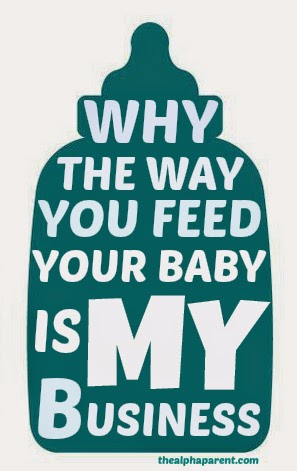
“My baby, my choice”.
“It’s got nothing to do with you how I feed my baby”.
“Live and let live”.
These are classic lines you’ll hear from some defensive formula feeding mothers whenever a breastfeeding advocate points out the flaws of formula. The message from those who give formula to their babies is clear: “It’s none of your business”. Yet I argue that the way a mother chooses to feed her baby IS my business. Read on to discover what motivates my judgy stance.
-
The abuse of developing countries riles me
…and the frustration is even moreso when that abuse is concentrated on infants.
Formula feeding in developing countries can lead to serious illness and even death. Take the Philippines for example. Just 16% of children between four and five months old are exclusively breastfed. This is one of the lowest documented rates on earth. Every year, according to the World Health Organisation, some 16,000 Filipino children die as a result of “inappropriate feeding practices”. These deaths are caused only by feeding children with formula. An article in The Guardian has highlighted that
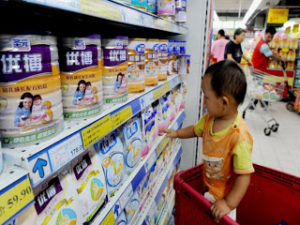
“Both the Government of the Philippines and the UN blame the manufacturers of baby formula for much of the decline in breastfeeding. These companies spend over $100m a year on advertising breastmilk substitutes in the Philippines. Those who appear most susceptible to this advertising are the poor, who are also the most likely to be using contaminated water to make up the feed. Some spend as much as one third of their household income on formula. Powdered milk now accounts for more sales than any other consumer product in the Philippines. Almost all of it is produced by companies based in the rich nations.”
Another issue is that the promotion of formula in developing countries results in a greater likelihood of closely spaced pregnancies, thus burdening women more and increasing the risk of their own deaths and that of their newborns and existing children. Formula feeding means that the contraceptive effect of breastfeeding is lost.
Of course, the Oscar for abusing developing countries goes to Nestle and their “milk nurses” (click here for more info).
Every time someone buys a can of formula, whether in the UK or abroad, they are fueling an industry which causes the death of thousands of babies. We live in a capitalist driven economy, so in effect, each pound/dollar we spend can be thought of as a vote. If I spend money on an industry that thinks it’s acceptable to use unethical practices to promote their products, or an industry that causes severe environmental destruction or death of people, then I am in effect, voting with my pound, to say that such behaviour is acceptable.
2. I find the suffering of my nation’s children equally offensive
As I pointed out in “15 Tricks of Formula Companies” (click here to view), the dangerous risks of formula are not limited to poor countries. Even in rich, industrialised countries such as the UK and USA, where formula is assumed to be safe, formula fed infants are more likely than breastfed infants to suffer from…
- Diarrhoea
- Meningitis
- Ear infections
- Blood infections
- Sudden Infant Death Syndrome (cot death)
- Diabetes
- Childhood cancers
- Obesity
- High blood cholesterol
- Asthma
- Reduced effectiveness of vaccinations
- Reduced effectiveness of organ transplants
- Candidiasis
- Enteroviruses
- Gastroenteritis
- Giardia
- Haemophilus Influenza
- Necrotizing Enterocolitis
- Pneumococcal Disease
- Respiratory Infections (general)
- Respiratory Infections (protective effect against exposure to tobacco smoke)
- Respiratory Syncytial Virus
- Salmonellosis
- Sepsis in Preterm Infants
- Urinary Tract Infections
- Anemia and Iron Deficiency
- Autoimmune Thyroid Disease
- Constipation and Anal Fissures
- Cryptorchidism (undescended testicle)
- Gastroesophageal Reflex
- Inguinal Hernia
- Lactose Malabsorption
- Morbidity and Mortality
- Plagiocephaly
- Pyloric Stenosis
- Wheezing and Asthma
- More pain during medical procedures
- Impaired jaw and teeth development
- Allergies
- Eczema
- Reduced Development and Intelligence
- Bedwetting
- Reduced Brainstem, Cognitive, and Motor Development
- Reduced IQ
- Reduced Gastrointestinal and Immune Development
- Hormone imbalance
- Reduced Neurological, Psychomotor and Social Development
- Disturbed Sleep Cycles and Arousal
- Reduced Speech and Language Development
- Reduced Thymus Development
- Autism
- Appendicitis
- Poor Bone mass
- Cardiovascular Disease (Atherosclerosis, Cholesterol Concentration)
- Celiac Disease
- Helicobacter pylori infection
- Haemophilus Influenzae Meningitis
- Inflammatory Bowel Disease (Crohn’s Disease, Ulcerative Colitis)
- Juvenile Rheumatoid Arthritis (JRA)
- Poor Mental Health
- Menopause (timing of) – I’m not joking
- Multiple Sclerosis
- Reduced Oral and Dental Health
- Reduced Protection against toxins (environmental contaminants, chemicals, heavy metals)
- Schizophrenia
- Reduced Stress Resilience
- Tonsillitis
This bumper sticker was found on the window of a hospital nursery in America (John D. Archbold Memorial Hospital in Thomasville, GA):


In the population of the 596,122 babies born in England and Wales in 2002, the number of cases of asthma, coeliac disease and obesity that could be prevented over 7-9 years if all babies were breastfed was 33,100, 2655 and 13639 respectively (Akobeng.AK and Heller.RF). In the USA, 720 babies under 12 months of age die each year because they are not breastfed (Chen.A and Rogan.WJ).

And don’t get me started on the issue of product recalls. “Most parents have taken for granted, when they buy a tin of formula, that the contents are of high quality, but they are overly complacent” (Palmer. G 2009, ‘The Politics of Breastfeeding’). Formula has been found to contain disease-causing microbes and pathogens. Dr. Derrick Jelliffe has characterized the history of formula production as “a succession of errors.” If I outlined each recall I’d be here all day. Suffice to say formula has been recalled for being contaminated with polyvinyl chloride, excessive magnesium, beetle parts, beetle larvae, pieces of hard plastic, elevated levels of lead, salmonella, glass particles, and enterobacter sakazakii (which can cause meningitis), to name a few of the incidents (read more information here). Needless to say, breastmilk will never be recalled. If the formula companies ceased marketing, they could spend the money saved on better quality control. However this will not happen because sales would fall without marketing, which refutes the common claim of formula companies that they only sell formula to fulfil a need.
Even when formula is not contaminated and is prepared according to Government guidelines, babies fed on it are significantly more likely to suffer from lifelong health complications. These scenarios occur worldwide, regardless of the wealth or development of the nation involved.
As I don’t use formula you may wonder why I’m troubled by this. However just because I did not give birth to the children suffering or put at risk because of formula feeding, this does not prevent me from feeling compassion for them. I find it short-sighted and self-centred that people expect me to care only for children to whom I have a genetic link.
What’s more, Article 24 of the Convention on the Rights of the Child recognises “the right of the child to the enjoyment of the highest attainable standard of health”. Thus I would argue that access to breastmilk is everybaby’s human right.
3. Formula feeding dumps on the environment
“The ecological consequences of cloth vs disposable diapers are debated routinely, yet they are small potatoes compared to the consequences of the breast vs. formula decision.” (Michels. D, ‘Mother Nature Loves Breastmilk’).
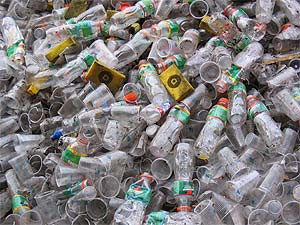
Every time a can of formula is purchased, the buyer is having a greater impact on the environment than they may be aware of. Let’s look at the stats:
- “The production of formula, cans, bottles, nipples, labels, packaging, and advertising uses trees, metal, glass, plastics, paper, and fuel. Artificial feeding of infants creates an enormous volume of waste materials” (Family Education).
- For every million formula-fed babies, 150 million tins are used, made from 23,706 tonnes of metal.
- The paper labels amount to 341 tonnes and the wasted paper materials of marketing goes way beyond that.
- A company director at Avent bottle manufacturer boasted that its UK factory distributed 20 million bottles per year. Manufacturing processes and disposal problems make infant feeding equipment environmentally harmful.
- “Bottles and nipples require plastic, glass, rubber, and silicon; production of these materials can be resource-intensive and often leads to end-products that are not-recyclable” (Michels.D).
- Cows’ milk is transported from farm to factory for processing into powdered milk, itself an energy intensive process. It then goes to another processing plant to be made into formula. This is marketed globally and imported over thousands of miles (Palmer.G).
- Cows need pasture. As the population of the world increases and more women formula feed, more cows are needed to produce milk to make infant formula, so wooded lands are cleared to provide grazing (Stanway.P).
- Livestock account for 18% of human-caused greenhouse emissions. In addition, cattle rearing is linked with water contamination and soil erosion. Cattle feed products are also transported across the world.
- A woman can produce hundreds of litres of breastmilk for a zero carbon footprint.

Because the environment is our life-support system, it’s impossible to truly estimate its value. The deterioration of the environment threatens the earth’s natural resources such as our clean water supply, fossil fuels for energy and food supply. Many of these resources are non-renewable. Once they are gone, they are gone forever. This is the legacy being left for our children.
4. Formula feeding undermines womans lib
Is infant feeding a feminist issue? There are compelling arguments which suggest so. The act of breastfeeding provides stunning evidence of women’s physical prowess and their contribution to the economy and human welfare. By nursing her baby, a woman confirms that she has the power to control her own body, and challenges medical hegemony. When we hand over the feeding of our babies to formula companies, we relinquish some of our power as women. As Palmer has maintained, “the production and aggressive promotion of commercial formula took power away from women and gave it to industry. Industry got richer and women got poorer.” The genius of formula marketing and advertising is to get women to withhold from their offspring that which they already have and to instead purchase a replacement product of questionable quality. It is akin to being a given a “choice” between the blood already flowing through your veins and a replacement product that marginally resembles blood (Remer).
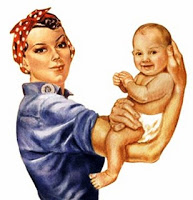
Instead of commonly being seen as a roadblock to women’s empowerment, breastfeeding should be seen as a facilitator of it. As Van Esterik remarked in her essay, “Breastfeeding: A Feminist Issue”, “Conditions supportive to successful nurturing, are conditions which reduce gender subordination generally by contradicting negative images of women and emphasising the value of women’s reproductive work.” In other words, to disvalue breastfeeding is to disvalue women.
The BBC has contended that “All mothers produce breastmilk”. If, for sake of argument, we concede that 98% of women can produce sufficient breastmilk (Baby Friendly UK) yet less than 3% do so exclusively until 6 months (Unicef), this means that at least 95% of women are unnecessarily surrendering their baby’s health to the will of multinational corporations such as SMA and Aptamil. As I said in my article, ’15 Formula Company Tricks’ (click here to view), the primary purpose of these companies is not to do good or even provide useful products. Rather they have a statutory duty to put the needs of their shareholders first, which makes profit their prime concern.

When we consider that the highest ranking executives of formula companies are men (Aptamil/ Cow&Gate – Mr. Jan Bennick; Heinz – Mr. William Johnson; Hipp – Mr. Klaus Hipp; Wyeth/SMA – Mr. Rober Essner), we begin to see the injustice from a gender perspective. Women have a gift that is highly valued in evolutionary terms (that of single-handedly birthing and nutritionally sustaining human infants), yet their competence in delivering this gift has been undermined by men.
Furthermore, a common conception of formula is that it aids a woman’s economic mobility through strengthening her role in the workplace. She is no longer tied to a dependant infant and can instead pass a bottle of formula to grandma and return to being economically active. However this perceived benefit is negated by the fact that formula fed children are significantly more likely to fall ill, and numerous studies have shown that a child’s illness commonly results in the mother rather than the father taking time off work (Journal of Early Childhood; Weimer.J; Nursery World; Mother and Baby; Working Mums Magazine). Thus when a woman is taking more time off work she is seen as a burden by her employer. This does not strengthen the role of women in the workplace. Consequently women of childbaring age are viewed as liabilities. This is not to mention the strain on employers caused by their employees sick children results in lower incomes for working families, thus reducing income tax revenues which pay for government programs and services that benefit everyone.
5. Widespread formula feeding distorts society’s perception of breasts
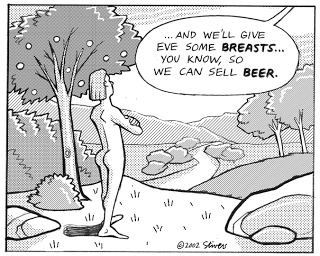
In our society we have an ironically degenerate view of breasts. They are seen first and foremost as sexual objects, while their nurturing function has been downplayed. This leads to a sizable proportion of women declining breastfeeding because it makes them feel uncomfortable. Although bottle-feeding is common in the mass media, visual images of breastfeeding are rare, and a mother may never have seen a woman breastfeeding (Shannon.T et al; Swanson.V et al).
The act of placing your breast inside an infant’s mouth is somehow “creepy”, a view which the deputy editor of Mother and Baby magazine propagates (The Telegraph; The BBC). Such beliefs make women feel embarrassed and fearful of being stigmatized by people around them when they breastfeed. In The GuardianYvonne Roberts observed that:
“The contradictions are endless. Breasts are allowed out on the Sun’s Page Three but not actually to feed in a public place without embarrassment. Sex is OK on television … but breast feeding? Now, that is disgusting.”
As I wrote in my article: “For and Against Breastfeeding in Public” (click here to view) people who have a negative response to viewing breastfeeding need to view more of it, then the act will no longer elicit a sensational reaction. The more women that breastfeed, the faster society’s perception of breasts as purely sexualised objects will change. Instead breasts will be viewed first and foremost as nurturing devices and providers of nature’s gold standard of nourishment for babies. This natural view of breasts already prevails in countries where breastfeeding is the norm and there is little formula feeding (Britton.C).
Therefore, for every woman that chooses formula over breast there is one less woman to normalise breastfeeding. Widespread breastfeeding would counteract the objectification and sexualisation of breasts, which is an especially important message for children.
6. Formula-use lowers the IQ of the population

“The nutrient advantages of human milk coupled with the mother-infant relationship provide the matrix for the child to reach his/her full intellectual potential” (Lawrence. R).
Breastfed children are more cooperative and socially better students the longer they are breastfed. In a study by Horwood. LJ and Fergusson. DM the high school drop-out rate was higher among children who had been formula-fed and lowest among those who had been breastfed equal to or longer than eight months, even when factors such as mother’s age, education, marital status, socio-economic status and family income were taken into account.
In the same study increasing duration of breastfeeding was associated with consistent and statistically significant increases in 1) intelligence quotient assessed at ages 8 and 9 years; 2) reading comprehension, mathematical ability, and scholastic ability assessed during the period from 10 to 13 years; 3) teacher ratings of reading and mathematics assessed at 8 and 12 years; and 4) higher levels of attainment in school leaving examinations. Furthermore, these effects are 1) pervasive, being reflected in a range of measures including standardized tests, teacher ratings, and academic outcomes in high school; and 2) relatively long-lived, extending throughout childhood into young adulthood.
Another study hypothesised that breast milk has a beneficial influence on cognition by affecting brain growth. Isaacs. E et al maintained that breast milk promotes brain development, particularly white matter growth.
It used to be thought that breast milk’s promotion of intellectual potential was down to it containing long-chain polyunsaturated fatty acids (LCPUFAs), notably docosahexaenoic acid (DHA). However when a synthetic form of DHA was added to formula milk, it was shown to have no developmental benefits (Simmer K et al). Instead the IQ safeguarding benefits of breastfeeding have been linked to the fact that human milk contains a wide variety of other factors including hormones and growth factors, some of which (e.g. thyroxin, nerve growth factor) are likely to influence cerebral development.
The contention that breastfeeding protects a child’s intellectual potential has also been backed up by numerous other studies (Quinn PJ et al; Kramer M et al; Mortensen EL et al; Angelsen. NK et al; Andersen JW et al; Gustafsson PA et al). These findings are not surprising when one considers that “cows’ milk (the main staple ingredient in most formula) is designed to rapidly grow an animal with a large body and a small brain whereas human milk is designed to grow a small body but a large and rapidly developing brain” (The Independent).

But why do I care about the IQ of other people’s children? As formula feeding lowers the IQ of the population, this means less scientific advancements. We’re talking about cures for cancers and other diseases, new amenities, new technologies, strategies to combat global warming, and so on. Our society is becoming much more of a service based economy than ever before, with most of our manufacturing jobs disappearing in favour of those jobs that require far more education and knowledge. Intelligence paves the way for societal developments which benefit the whole community. If the bulk of society carries on formula feeding we will never reach our potential for scientific advancement.
7. More formula – more child abuse
Breastfeeding mothers are less likely to abuse their children. Controversial? Yes. Can I back it up with stats and research? Indeed (Reuters; Strathearn et al; Lvoff NM et al; Picton. G; American Society of Registered Nurses).
There are many reasons why breastfeeding has been shown to have a protective effect against abuse. The most prominent hypothesis is that breastfeeding enhances maternal responsiveness by stimulating oxytocin release, which is associated with reduced anxiety and elevated mood, a blunted physiological stress response, and more-attuned patterns of maternal behaviour (Strathearn.L; Chiodera P et al; Heinrichs M et al; Uvnäs-Moberg K and Eriksson M). These findings are consistent with animal research on the effects of oxytocin on long-term maternal behavior.
In the same vein, research has found that non-breastfeeding mothers demonstrate reduced brain responses when they hear their baby cry (Time).
Another hypothesis suggests that mothers who decide to breastfeed may be more emotionally invested in motherhood and in their child; in turn, these mothers may be less likely to neglect or abuse their child (Strathearn et al).

An alternative, and in my opinion more compelling hypothesis, is that breastfed babies are less likely to be abused because they cry roughly half as much as formula-fed babies. This is because breastfed babies don’t need to wait for formula to be mixed and bottles to be warmed up; also a mother’s breast is a more effective pacifier than an artificial plastic teat; moreover formula-fed babies are in gastric distress much of the time – because formula is significantly harder to digest than breastmilk. Consequently, breastfeeding reduces the chances that a baby will be abused by causing the baby to cry less. Crying is one of the main triggers of abuse in infants (Children’s Memorial Hospital; Barr. R; Lee.C et al; Kids Health).
Other research has shown that parents who are sleep deprived are more likely to abuse their babies (Meltzer. L & Mindell. J). It’s a common misconception that formula-feeding parents sleep longer. In reality breastfeeding mothers get more sleep and their sleep is of higher quality. A breastfed baby can eat as soon as she or he is hungry. If cosleeping, that means before the baby even starts to cry. A formula-fed baby has to wait for formula to be prepared and warmed, in the meantime getting more and more distressed and agitated as well as waking others in the household. When breastfeeding, even the mother does not need to wake up fully to nurse her baby. Furthermore, the hormones produced during nursing have a relaxing effect, and the mother is likely to sleep even better when she nurses her baby.
Regardless of which hypothesis one favours, the fact remains that formula fed babies are more likely to be abused. Abused children are more likely than unabused children to grow into abusers themselves (Pears KC, Capaldi DM; Pianta R, Egeland B, Erickson MF). Thus, a vicious circle is perpetrated. I’m sure I’m not alone in contending that any behaviour which is likely to increase child abuse should be avoided wherever possible.
8. More formula – more crime

Countries with a high rate of breastfeeding benefit through reduced crime, reduced unemployment and generally stronger attachments with family and community supports (Barker 2008). Children who are not breastfed have particularly higher rates of delinquent, aggressive and anti-social behaviour (Oddy.W; Reuters; Telethon Institute for Child Health Research; Fraiser.J; York University). In a large-scale study only 4% of the breastfed babies showed a tendency to behavioural problems compared with 16% of those fed formula milk (The Guardian).
As with the relationship between formula feeding and child abuse discussed above, the relationship between formula feeding and crime has been the subject of various different hypothesis. One study suggests that delinquency in formula fed children is the result of a weaker maternal bond through not breastfeeding. Fergusson and Woodward maintain that “children who were breast fed for a longer duration were more likely to report higher levels of parental attachment and tended to perceive their mothers as being more caring and less overprotective towards them compared with bottle-fed children.” This is the case even when data were adjusted for maternal demographics.
Another hypothesis looks at the IQ enhancing effects of breastfeeding (discussed above). For some time, researchers have known that people with criminal records tend to have low IQ scores (Hunt. E). Furthermore it has been shown that low IQ leads to delinquency rather than results from it (Lynam. D). Therefore by formula feeding a parent is increasing the risk that their child will turn to crime when they are older. The consequences of crime impact on the whole of society.
9. Formula-feeding hinders herd-immunity
Before I explain the technicalities of ‘herd immunity’ it is important to recognise that breastfeeding ensures that vaccinations have full effectiveness. Breastmilk promotes the response to immunisation made by the still maturing immunologic and enterohepatic systems of infants. It “influences physiologic parameters that can change metabolism of ethylmercury derived from some vaccines” (Dorea. J). Following vaccination, antibody levels are significantly higher in the breast-fed than formula-fed infants (Pabst.HF and Spady.DW; Silfverdal.SA et al).
As breastfeeding is the biological norm it is a fact that the use of formula lessens the effectiveness of vaccinations. This has significant consequences for herd immunity, otherwise known as ‘community immunity.’ Herd immunity:
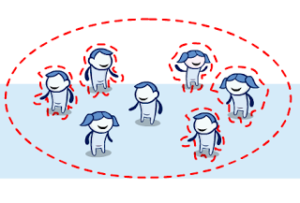
“describes a form of immunity that occurs when the vaccination of a significant portion of a population (or herd) provides a measure of protection for individuals who have not developed immunity. In contagious diseases that are transmitted from individual to individual, chains of infection are likely to be disrupted when large numbers of a population are immune or less susceptible to the disease. The greater the proportion of individuals who are resistant, the smaller the probability that a susceptible individual will come into contact with an infectious individual” (Wikipedia – Herd Immunity).
Herd immunity protects people who cannot safely receive vaccines because of a medical condition such as an immune disorder or for organ transplant recipients. It also protects people who don’t respond to vaccines. Formula feeding reduces the effectiveness of vaccinations, thus weakening herd immunity, putting vulnerable members of society at risk.
10. More colds and flu floating about
As I touched upon above, breastmilk protects and nurtures a baby’s developing immune system (NHS). It has beneficial effects on intestinal flora (Oddy. W) and contains unmatchable immunological properties (Field. C). This protection can last many years (Hanson. L)
Prematurely discontinuing breastfeeding can facilitate pathogenesis of many chronic diseases later in life – e.g, autoimmune disorders (Jackson. K and Nazar. A). This is not only bad for formula fed babies, it also has implications for vulnerable members of society such as the elderly or persons with auto-immune diseases. The theory is similar to herd immunity in vaccinations. Formula fed infants have a weaker immune system than nature intended. This means that more cold and flu viruses are passed around.
11. The redundancy of nature’s contraceptive
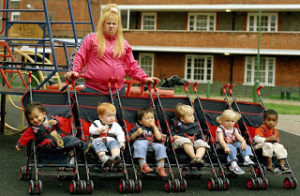
Mothers who formula feed miss out on the contraceptive affect of exclusive breastfeeding (this is one of the reasons that they are at greater risk of ovarian cancer). Consequently they are more likely to have closely spaced pregnancies. The fact that this is a problem is not unique to developing countries. As mothers who formula feed are more likely to come from lower-economic, uneducated, disadvantaged groups (The Guardian), the increase in closely spaced reproduction perpetuates a cycle of poverty. Any contraceptive choice that is removed from a woman reduces her economic choices. This creates more kinds of headache for the taxpayer. For instance, it can cost the taxpayer over £154,000 to support a single mother over a decade (The BBC).
12. Formula fed babies clog up hospital and doctor waiting lists
Formula fed children clog up waiting rooms in both hospitals and GPs surgeries. Since they are statistically less healthy, formula fed babies see the doctor more often (McConnachie.A). They have a higher risk of infection, and are more likely to spend time in hospital during their first year (Shiva.F and Ghotbi.F; Hengstermann.S; Galton Bachrach. VR et al; Quigley.MA). This difference does not depend on the social or economic status of the baby’s family.

One comparative study in the US and UK, focusing on just three medical complaints – lower respiratory tract illnesses, otitis media, and gastrointestinal illness – found that in the first year of life, after adjusting for confounders, there were 2033 excess doctor visits, 212 excess days of hospitalization, and 609 excess prescriptions for per 1000 formula fed infants compared with 1000 infants exclusively breastfed for at least 3 months (Ball. T and Wright. A). These excess visits would be preventable by breastfeeding, thus freeing up doctors to tend to needy patients with unpreventable illness.
13. Formula culture is anti-breastfeeding
Formula feeding is viewed by many as the “normal” way to feed infants. This formula culture makes life difficult for current and future breastfeeding mothers. It perpetuates a vicious circle: less women breastfeed – breastfeeding seen as subnormal – hostility towards breastfeeding mums – less women breastfeed.
Until more women breastfeed the “boobie-traps” of our formula culture will continue to make life unnecessarily difficult for nursing mothers. By boobie traps I’m talking about such things as aggressive formula marketing; lack of support from family and friends; insufficient knowledge among medical professionals about breastfeeding techniques and challenges; misinformed postnatal hospital practices; and cultural attitudes (Read more about boobie traps here).
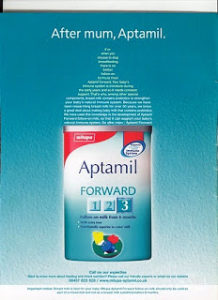
Taking aggressive formula marketing for example, formula companies invest millions of pounds in marketing material that undermines breastfeeding (see how it is done here). One of their strategies is to plant seeds of doubt in the mind of the breastfeeding mother where there were none before. For instance, many commercials for follow-on milk cite that “when you decide to move on from breastfeeding, use our formula”; note that the commercial says “when” not “if“. The assumption is that all breastfeeding mothers must move onto formula at some stage, presumably at 6 months. Unfortunately this untruth has been absorbed by health professionals and then regurgitated to parents as the common misconception that “there is no nutritional value in breastmilk after 6 months”.
Another example of formula companies erecting unnecessary hurdles in the way of breastfeeding mothers can be seen via their company ‘carelines’. Many of these hotlines and their associated website content maintain that in order to successfully breastfeed a mother must consume a specialist diet, which is nonsense (read more about the strategies of formula company carelines here). The more people that buy formula, the more money formula companies have to perpetrate such inaccurate and misleading marketing, thus distorting choice for all women.
Likewise, the more people that buy formula, the more money formula companies have to manipulate health care professionals (see how it is done here) which not only makes breastfeeding mother’s lives harder (click here to see how health visitors in particular do this), it also stalls medical progress. Accurate information on formula, its ingredients, its safe preparation, and its risks are obscured by heavy marketing campaigns and the pseudo-science they contain. Many of these campaigns are aimed at health care professionals, who assimilate the information and then relay it back to parents.
14. Draining the public purse
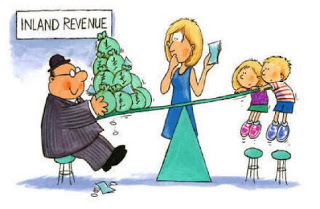
A sizeable proportion of my household income goes to the Government in the form of taxes. This is money taken from my purse that could have been used to feed and clothe my children, so naturally I have an interest in what it is spent on.
Firstly, the UK tax-payer supplements the formula-use of low income families (HM Revenue and Customs). The same goes for US tax-payers; at least one-third of the US infant formula market receives support from government programs. Those programs include both food stamps as well as the Special Supplemental Nutritional Program for Women, Infants, and Children (WIC). Tax payers also supplement formula used by the general population as there is no tax (VAT) on formula. Curiously there is still tax on nursing bras, breast pumps, breastpads, nipple cream, etc. Thus breastfeeding mothers pay tax on their paraphernalia, yet formula feeding mothers do not. The tax lost from formula is supplemented by the public purse. Is this fair in light of the fact that breastfeeding mothers and their healthier babies cost the Government less?

Secondly and perhaps more importantly, the additional number of illnesses needlessly suffered by formula-fed babies translates into staggering medical costs. UK taxpayers would save £360 million for every year of higher breastfeeding rates. This would be made up of annual savings in treatment costs and lifetime contribution to the economy from infants who would otherwise have died prematurely. In 1991, in an English town, the costs of treating just 150 formula fed babies hospitalised for diarrhoea was estimated to be £225,000. Hospitalisation for diarrhoea is almost unknown for exclusively breastfed babies (Palmer. G).
Breastfeeding an infant saves £305 on medical costs alone during just the first 6 months of a baby’s life. When you consider that there are 605,634 babies born annually in the UK, if they were all breastfed for 6 months that would be a hell of a lot of taxpayers money saved. £305 x 605,634 = £184,718,370. Think about how many new homes, hospitals and schools could be built annually with that!
If there was just a 10% improvement in breastfeeding that would mean that 60,563 additional babies would be breastfed. UK taxpayers savings for just three illnesses and the formula, bottles and teats, would therefore be: 27
- about 17,000 cases of otitis media avoided at a saving of £509,000.
- almost 3900 cases of gastroenteritis being avoided, at a saving of £2.6 million
- over 1500 cases of asthma being avoided, at a saving of £2.6 million.
- a reduction in the cost of teats and formula of £102,000
(Source: Baby Milk Action. To see the cost of formula v breastfeeding in other countries, read this).
In the US a minimum of $3.6 billion would be saved annually if breastfeeding rates were increased. This figure is likely to be an underestimation of the total savings because it represents cost savings from the treatment of only three childhood illnesses: otitis media, gastroenteritis, and necrotizing enterocolitis.
Furthermore, formula feeding is subsidized by American taxpayers through WIC programs (supplemental nutrition programs for poor families), which spend over $578 million dollars on infant formula annually. WIC is the largest purchaser of infant formula, buying approximately 40 percent of all formula sold in the United States.
Thus the conclusions are unanimous: It is more expensive to provide formula than to breastfeed, and formula-feeding results in excess illness, which increases the cost of health care. Treating the ill-effects of formula feeding drives a significant amount of money away from the treatment of conditions such as Parkinson’s disease, motor neurone diseases, diabetes, cerebral palsy, heart disease, muscular dystrophy, and from cancer research. People unfortunate enough to be affected by non-preventable diseases through no fault of their own are being significantly disadvantaged by the preventable increase of ill health caused by formula feeding. Therefore whilst formula feeding parents contribute to the prosperity of formula companies, they are also contributing to the state of inadequacy found in NHS care for terminally ill patients.
The salt in the wound is the fact that formula companies are not paying for the social and financial debt they continuously bring about. In the UK, HM Revenue and Customs estimate that companies avoid £13.7 billion worth of taxes by using ‘tax havens’. Consequently, the bulk of tax is paid by the mass of ordinary middle or low paid people like you and I. Is it any wonder that so many breastfeeders feel contempt towards their formula feeding peers? (An issue discussed in great length in my book ‘Breast Intentions’).
In conclusion…
Just to clarify, I fully defend a woman’s right to chose how she feeds her baby IF that choice is fully informed, free from bias and backed up with adequate support; yet as I pointed out in Top 10 Breastfeeding Boobie Traps and 15 Formula Company Tricks the choice of whether to breastfeed or formula feed is far from fully informed and support is patchy. The consequence of manipulation from formula companies is the production and maintenance of a society where shareholders bonuses are valued above infant health, babies are dying and women have warped cynical views of their bodies. By giving their cash to formula companies, parents are fuelling this cycle, providing a bleak outlook for future generations. Research has shown that formula-use is environmentally inherited. In other words, if you formula feed, your children are more likely to formula feed when they become parents. Thus, one formula feeding parent can equate to generations of formula feeding. The problems mentioned above (strained healthcare services, deteriorating environment, delayed women’s liberation, etc) are prolonged for decades.
So next time you feel the urge to tell a lactivist (or anyone else for that matter) to mind their own business, bear in mind that our choices are not made in isolation, they often have widespread implications for other people and society as a whole.










